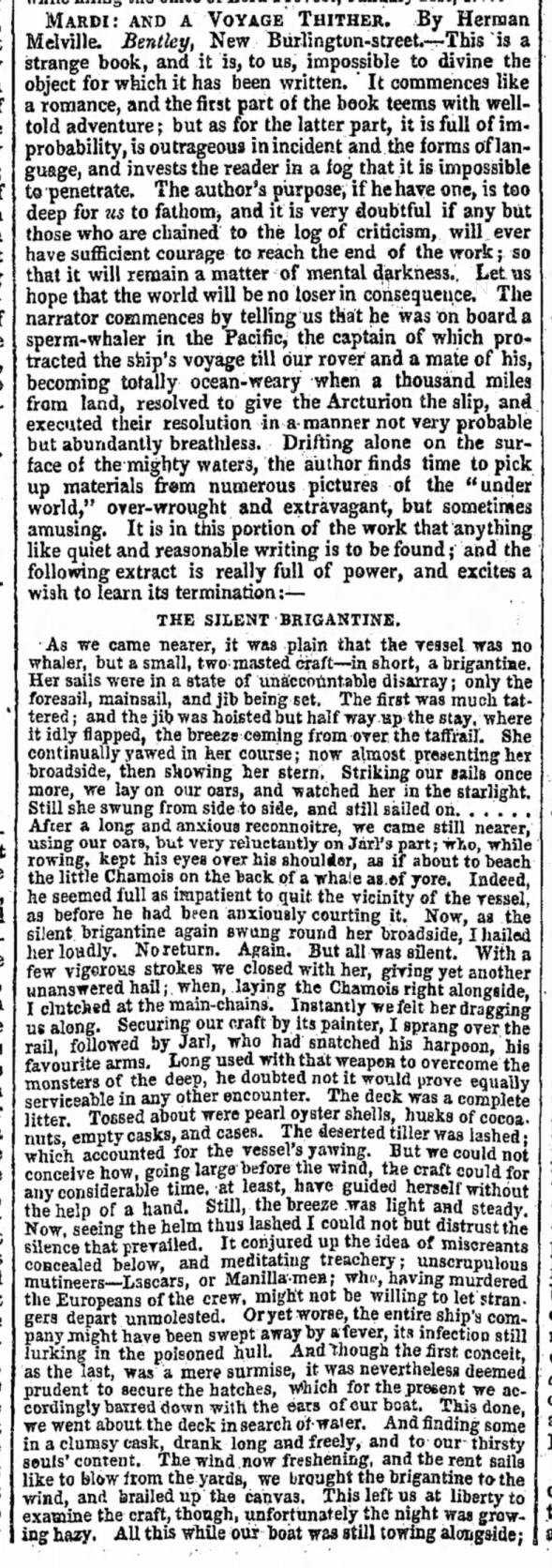A great many of the 521 mentions appear in booksellers' ads. Not all though: here's one promoting Melville's lecture on The South Seas, from the Wisconsin State Journal of February 25, 1859:521 matches
added in the past month×"herman melville"1819 - 1891×
HERMAN MELVILLE, the celebrated novelist, lectures in Milwaukee, this evening.
 · Fri, Feb 25, 1859 – 2 · Wisconsin State Journal (Madison, Wisconsin) · Newspapers.com
· Fri, Feb 25, 1859 – 2 · Wisconsin State Journal (Madison, Wisconsin) · Newspapers.com
Many of the recently added archives are British including images from London newspapers
- The Examiner
- The Morning Chronicle
- The Morning Post
- The Pall Mall Gazette
 · Sun, Apr 1, 1849 – 8 · Lloyd's Weekly Newspaper (London, Greater London, England) · Newspapers.com
· Sun, Apr 1, 1849 – 8 · Lloyd's Weekly Newspaper (London, Greater London, England) · Newspapers.com
 · Sun, Apr 1, 1849 – 8 · Lloyd's Weekly Newspaper (London, Greater London, England) · Newspapers.com
· Sun, Apr 1, 1849 – 8 · Lloyd's Weekly Newspaper (London, Greater London, England) · Newspapers.com
MARDI: AND A VOYAGE THITHER. By Herman Melville. Bentley, New Burlington-street.--This is a strange book, and it is, to us, impossible to divine the object for which it has been written. It commences like a romance, and the first part of the book teems with well-told adventure; but as for the latter part, it is full of improbability, is outrageous in incident and the forms of language, and invests the reader in a fog that it is impossible to penetrate. The author's purpose, if he have one, is too deep for us to fathom, and it is very doubtful if any but those who are chained to the log of criticism, will ever have sufficient courage to reach the end of the work; so that it will remain a matter of mental darkness. Let us hope that the world will be no loser in consequence. The narrator commences by telling us that he was on board a sperm-whaler in the Pacific, the captain of which protracted the ship's voyage till our rover and a mate of his, becoming totally ocean-weary when a thousand miles from land, resolved to give the Arcturion the slip, and executed their resolution in a manner not very probable but abundantly breathless. Drifting alone on the surface of the mighty waters, the author finds time to pick up materials from numerous pictures of the "under world," over-wrought and extravagant, but sometimes amusing. It is in this portion of the work that anything like quiet and reasonable writing is to be found; and the following extract is really full of power, and excites a wish to learn its termination:--
THE SILENT BRIGANTINE.
[ Excerpt from volume 1, chapter 19 of Mardi: And A Voyage Thither from "As we came nearer, it was plain…." to "... superstitious misgivings"; and from "Groping again into the chest...." to ... somewhat different from anything of the [that] kind he had ever heard before."]
The termination of the adventure brings also the termination of the romance; and what follows is a conglomeration of incomprehensible matters. The narrator and his friend engage in a chase of a young female, whom he rescues when about to be offered as a human sacrifice; and while thus employed they pass many islands such as Gulliver might have visited--haunts peopled by folks who are not human creatures, but merely Follies or Widsoms tattooed or feathered, "drinking wild wine" or telling stupid stories, as may be. Swift wrote with a purpose--a purpose that was visible on the surface--when he told us what the Lilliputians and the Brobdignagians did, said, and thought; not so with Mr. Melville, who, after rioting wildly amidst a most chaotic confusion, leaves the reader in a state of glorious mystification as to what he has been perusing.Below, the publisher's advertisement from the London Examiner on November 1, 1851 presents Melville's The Whale as number three in "Mr Bentley's List of New Books," in between The Ansayrii and Mignet's History of Mary Queen of Scots.
 · Sat, Nov 1, 1851 – 16 · The Examiner (London, Greater London, England) · Newspapers.com
· Sat, Nov 1, 1851 – 16 · The Examiner (London, Greater London, England) · Newspapers.com

No comments:
Post a Comment